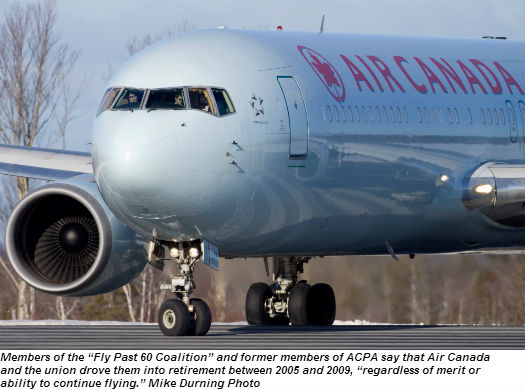Estimated reading time 6 minutes, 36 seconds.
One of the most convoluted age-discrimination cases in Canadian history, involving dozens of Air Canada pilots forced to retire at 60 by the terms of their union contract, has been fired back at the Canadian Human Rights Tribunal by a Federal Court judge.
In his 159-page ruling on Adamson and others v. Air Canada and others, eight months after hearing arguments, Mr. Justice Peter Annis said on Jan. 27 that the Tribunal should reconsider the question of whether older pilots should be stereotyped as being somehow less competent than their younger colleagues. He also suggested that it is up to Air Canada and the Air Canada Pilots Association (ACPA) to prove their case with “concrete” evidence.
Robert Adamson is at the front of the court document by virtue of his surname’s place in the alphabet. He and the other applicants, including the estates of several who have died as the case churned through a series of seemingly contradictory hearings, sought a judicial review of the Canadian Human Rights Tribunal’s August 2011 dismissal of age-based discrimination complaints.
All members of a “Fly Past 60 Coalition” and former members of ACPA, which has more than 2,800 pilots on its roster, say the carrier and the union effectively drove them into retirement between 2005 and 2009, “regardless of merit or ability to continue flying.”
Air Canada’s pension plan has stipulated mandatory retirement of pilots at age 60 since 1957, but Adamson and the others complained to the Tribunal that this element of their contract violated the Canadian Human Rights Act. The Tribunal, which took 18 months to issue its ruling, said mandatory retirement was not discrimination as defined in Section 15(1)(c) of the Canadian Human Rights Act.
However, that part of the Act was later repealed by Parliament when it was held to be in fundamental conflict with the equality provisions of the Canadian Charter of Rights and Freedoms. (The amendment which repealed Section 15(1)(c) was buried in the federal government’s 2011 omnibus budget bill, along with a host of other non-budget items, but didn’t take effect until December 2012.)
In sending the case back to the Tribunal, Annis said it had erred in several ways, including likening Air Canada pilots to those who flew for 10 other carriers, including WestJet and Air Transat. The judge, who was only appointed to the Federal Court in February 2013 – but who had specialized in, among other things, labour and employment law while in private practice – said a more valid comparison would have been with pilots who fly domestically and internationally in more than one aircraft type.
He noted that Air Canada pilots are “the best paid in Canada, with generous benefits” which include “a lucrative defined benefit pension . . . along with good job prospects to fly for other airlines after retiring on account of their training and experience.”
Accordingly, he focused on the mandatory retirement provision “in an area of scarce good jobs with relatively little financial hardship on retirement.”
Annis acknowledged that Canada adheres to International Civil Aviation Organization (ICAO) standards and noted that, until 2006, ICAO set a maximum age of 60 for a pilot in command. However, he added, it “recommended but did not require” that a co-pilot on international routes not fly past the age of 60. “In November 2006, ICAO set 65 as the maximum age for pilots and set as the standard that if one pilot was over 60, the other must be under 60.”
Moreover, in its submission to ICAO when the age factor was being discussed, Transport Canada’s position was that there should be no age restriction, and that it had no objections to pilots who are 60 or older flying in domestic airspace. Meanwhile, in the U.S., the retirement age of airline pilots has been 65 since late 2007.
Citing the Tribunal’s dismissal of the ACPA application, Annis concluded that the Tribunal had failed to justify its decision properly and transparently, in that it had “omitted to consider important aspects of the evidence that demonstrated a significant adverse financial impact on younger pilots.”
Most important, he said, the Tribunal had “mischaracterized the impact of extending the pilots’ careers as a matter of delaying retirement, without considering ACPA’s submission that the pilots would be working an additional three years to achieve the net total revenues situation portrayed at age 63.” As for the younger pilots in the group, that effectively would mean that they would be “working for highly reduced effective rates of pay or even for free during those three years.”
Annis said the various rulings were the result of having “different issues being decided at different steps in the judicial history,” and that “unfortunately this pattern of overturning the Tribunal’s decision and sending the matter back for redetermination on different issues does not end with this case.”
Nevertheless, the Fly Past 60 Coalition called it “a huge step forward” in enabling older pilots to remain active, adding that if the Tribunal eventually rules in their favour, there are more than 200 outstanding complaints to be heard.
While costs were not awarded by Annis, there is the prospect of damages possibly being awarded against Air Canada and ACPA. In one of the earlier cases, $100,000 was awarded to each of the two pilots involved, roughly equivalent to one year’s salary, even though it could have been double that under the rules. Multiply that by 200 and the potential bill could be $20 million – or even more.

